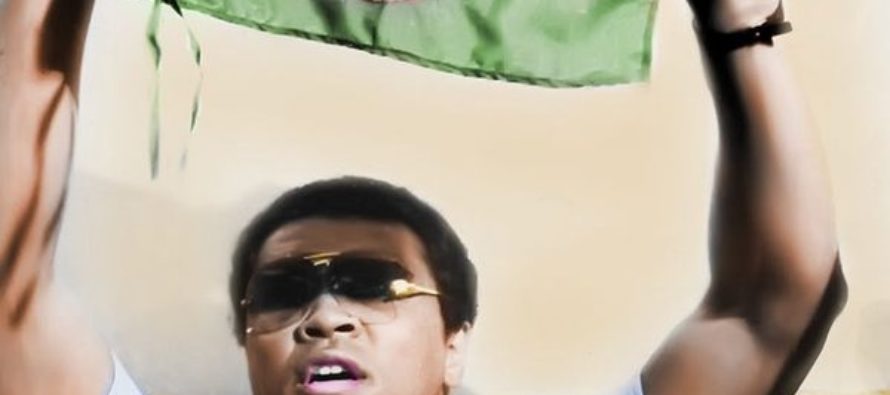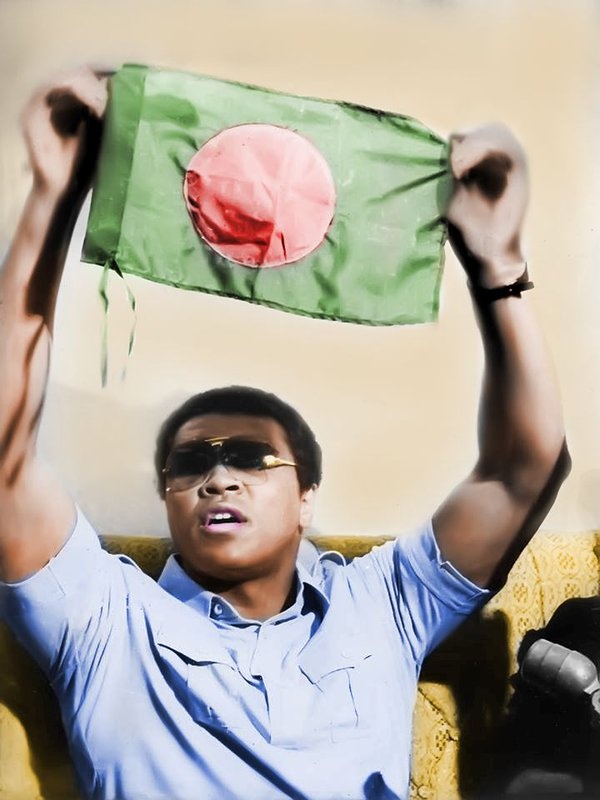Muhammad Ali’s visit to Bangladesh

Muhammad Ali was born as “Cassius Clay” in 1942. He changed his name and religion because he wanted to be a freeman. And Islam stands for peace to which he was attracted and the extremists in Islam such as Al Quaeda or Taleban or Islamic State did not appear with violent activities in the world.
Muhammad Ali had admiration and respect for the people of Bangladesh for their valiant fight against the barbarism of the occupation army in 1971 and he visited Bangladesh in 1978 to meet the people. It was a memorable trip for both sides.
He was given the Bangladesh citizenship. I had the opportunity of accompanying him from the Foreign Office on a boat trip from Dhaka to Chandpur through the Buriganga, Dhaleswari. Padma and Meghna rivers. During the seven-hour trip Bengali music was played to his liking.
He and his wife Veronica (later divorced) enjoyed the trip and the according to them, the height of the enjoyment of the trip was to witness catching a fish from the river, preparing and serving it to them as they wanted.
Our chef of the boat was a middle aged person and he was proud to prepare the dish for the guests. After the meal Muhammad Ali shook hands with him and admired his prepared dish which was found delicious by them.
Muhammad Ali chose boxing as a sport under strange circumstances. His cycle was stolen at the age of 12. He went to a police officer and told him that he would wound the person who stole the bike. Muhammad Ali (Clay) was directed to the basement of the building and the Columbia Training Centre, where police officer Joe Martin was in charge of the boxing programme. Martin advised Cassius Clay (Mohammad Ali) he had better hone his punching skills before setting off in pursuit of the thief. We have to hail the criminal who stole Muhammad Ali’s bike!
In 1999, Muhammad Ali was named by Sports Illustrated Athlete of the Century and the BBC’s sportsman of the century. By then he had become transcendental figure in the world of sport. He is the greatest sportsperson in the world as the Sports Illustrated called him. He won 56 out of 61 matches and was three times champion. He was the greatest emancipist of all time. He was a person known in every corner of the globe and the important matter was that in every match people would support him to win.
He was 6-feet 3 inches tall with high intelligence, bragged about his boxing skill and the same time exhibited modesty, humility. In his spare time, he used to talk to any people who used to meet him. He was jovial person and his eyes indicated this characteristic in him. He respected the dignity of a human being irrespective of status in the society. His quotes are still popular. He was also a kind man. He took many tours to Latin American countries to raise money for the Children’s hospital. The children loved him.
On page on Norman Mailer’s 1975 book “The Fight” he describes Muhammad Ali up close thus:“ The world’s greatest athlete is in danger of being our most beautiful man. Women draw an audible breath. Men look down. They are reminded again their lack of worth. If Muhammad Ali never again opened his mouth to quiver the jellies of public opinion, he would still inspire love and hate. “
During my discussions, I found him knowledgeable in current affairs and his views on war, peace and humanity were characterised by high degree of morality, compassion, empathy. His news conferences became almost as eagerly-awaited as his fights. Access to television was increasing around the world and he embraced the medium to maximum effect. Cameras and microphones became his best buddies.
He was the greatest boxer as Pele in his soccer game and Don Bradman in cricket. His refusal to be conscripted to go to Vietnam cost him a short time in jail, four years of his career and all his gains to that time but he would ultimately win that fight in the US Supreme Court.
Finally Muhammad Ali risked his fame and fortune and preferred dignity and truth by not joining the Vietnam War. He said that he had no quarrel with Vietnamese people and exhibited greatness and played and lived up to it.
In 1996 Ali’s last grand public appearance, shimmering and shaking a little as he lit the flame of the Atlanta Olympics.. Already Parkinson’s was taking toll and since then he receded from public view.
Boxing became popular and romanticised because of Muhammad Ali. Although he is no more with us, who would deny his immortality? His funeral brought people from all religions and even in death his greatness was recognised.
By Barrister Harun ur Rashid
Former Bangladesh Ambassador to the UN, Geneva

Barrister Harun ur Rashid
Former Bangladesh Ambassador to the UN, Geneva and Former Bangladesh High Commissioner to Australia (1982-84)
Related Articles
সিডনির অনিক এখন চিরঘুমে রকউড গোরস্তানে
ফজলুল বারী: শোকার্ত বাবা-মা-ভাই-স্বজন, সহপাঠী-বন্ধুরা চোখ ভেজানো কান্নায় শেষ বিদায় জানালেন অনিককে। মনোয়ার সরকার অনিক (২৪) । অস্ট্রেলিয়ার সিডনির বুকে
India-Israel close relationship may likely to be stronger
Israel’s relationship with India under the Modi government is likely to be stronger because of two reasons. First it is
প্রধানমন্ত্রীর দিল্লি সফর: কিছু ভাবনা
বিজয়ের মাস ডিসেম্বর। এই বিজয় অর্জনে ভারত ও বিশেষ করে ইন্দ্রাগান্ধী এবং ভারতীয় সেনাবাহিনী অসামান্য অবদান রেখেছিলেন বাংলাদেশের মুক্তির সংগ্রামে।







Up, close and front……. A very good, readable account of the famous boxer and his visit to BD.